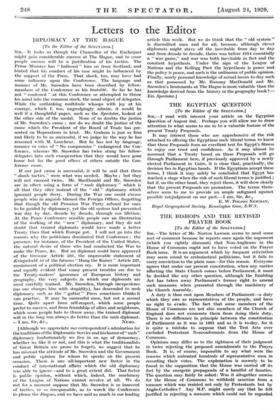Letters to the Editor
DIPLOMACY AT THE HAGUE
[To the Editor of the SPECTATOR.] SIR,—It looks as though the Chancellor of the Exchequer might gain considerable success at The Hague, and to some people success will be a justification of his tactics. The Prime Minister has " hallooed " him on from Scotland, and hinted that his conduct of his case might be influenced by the support of the Press. That shock, too, may have had some influence upon the Conference. The language and manner of Mr. Snowden have been described by fellow- members of the Conference as his brutalite. So far he has not " conferred " at this Conference or attempted to throw his mind into the common stock, the usual object of delegates. While the unthinking multitude whoops with joy at his courage, which I, too, ungrudgingly admire, it would be well if a thoughtful paper, such as the Spectator, looked at the other side of the medal. None of us doubts the justice of Mr. Snowden's cause ; nor do we doubt the justice of the cause which the President of the Board of Trade has pre- sented on Reparations in kind. Mr. Graham is just as firm and likely to be as successful, if we judge by the way he has reasoned with M. Loucheur. But he has not by language, manner or cries of "No compromise" endangered the Con- ference, whereas Mr. Snowden has twice stung his fellow- delegates into such exasperation that they would have gone home but for the good offices of others outside the Con- ference room.
If our just cause is successful, it will be said that these "shock tactics" were what was needed. Maybe ; but they will not succeed twice. Mr. MacDonald and Mr. Snowden are in effect using a form of "mob diplomacy" which is all that they offer instead of the " old " diplomacy which ignorant people decry. During the War one could excuse people who in anguish blamed the Foreign Offices, forgetting that though the old Prussian War Party refused for once to be guided by diplomacy, yet the old system had prevented war day by day, decade by decade, through our lifetime. At the Peace Conference sensible people saw an illustration of the working of the " new " diplomacy, and they do not doubt that trained diplomats would have made a better Treaty than that which Europe got. I will not go into the reasons why the politicians dominated that Conference ; the presence, for instance, of the President of the United States, the natural desire of those who had conducted the War to make the Peace, &c. But no diplomat could have approved of the tiresome Article 231, the unprovable statement of Kriegschuld, or of the fatuous "Hang the Kaiser" Article 227, reminiscent of a political election cry. It is more important and equally evident that many present troubles are due to the Treaty-makers' ignorance of European history and geography, the very subjects in which our diplomats are most carefully trained. Mr. Snowden, through inexperience (no one charges him with stupidity), has descended to mob
diplomacy such as the " gutter " Press sometimes thinks it can practise. It may be successful once, but not a second time. Quite apart from self-respect, which some people prefer to success, and from friendship of allies and neighbours, which some people hate to throw away, the trained diplomat will in the long run always do better than the mob diplomat.
[Although we appreciate our correspondent's admiration for the traditions of the Diplomatic Service and his horror of" mob" diplomacy (unfortunately we live in an age of democracy, whether we like it or not, and this is what the traditionalists of Great Britain are prone to forget), we suggest that he has misread the attitude of Mr. Snowden and the Government and public opinion for whom he speaks on the present occasion. There is one all-important new factor in the conduct of international affairs which the old diplomacy was able to ignore—and to a great extent did. That factor is public opinion, without which, indeed, the machinery of the League of Nations cannot revolve at all. We do not for a moment suppose that Mr. Snowden is so innocent of tactics, or so irresponsible, as to wreck the Conference to please the Jingoes, and we have said as much in our leading
article this week. But we do think that the "old system" is discredited once and for all, because, although clever diplomats might stave off the inevitable from day to day and from decade to decade, theirs was before 1914 essentially a "war game," and war was both inevitable in fact and the constant hypothesis. Under the sign of the League of Nations and the Kellogg Pact the hypothesis is peace and the policy is peace, and such is the ordinance of public opinion. Finally, surely personal knowledge of actual issues to-day such as that possessed by Mr. Ramsay MacDonald and Mr. Snowden's lieutenants at The Hague is more valuable than the knowledge derived from the history or the geography book ?— ED. Spectator.]






























 Previous page
Previous page